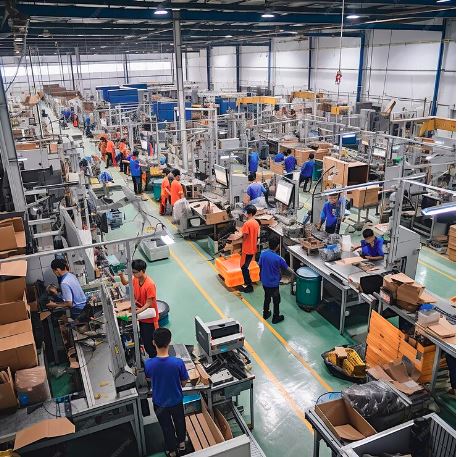When you hear about the pharmaceutical industry, what comes to mind? Most likely, it’s something about life-saving medications, cutting-edge treatments, and a lot of complicated science behind it all. But there’s one thing that ties everything together, and that’s quality—quality that can make the difference between success and failure, between saving lives or potentially causing harm. This is where GMP (Good Manufacturing Practices) come into play.
If you work in the pharmaceutical industry, you’ve likely come across GMP at some point. But what does it really mean for you and your team? And, most importantly, why is GMP training such a crucial part of ensuring that the products you manufacture are safe and effective? Let’s break it down.
So, What Exactly is GMP?
Before we get into the training aspect, let’s clarify what GMP even is. Good Manufacturing Practices are a set of guidelines and regulations enforced by regulatory agencies (like the FDA, EMA, and others) to ensure that pharmaceutical products meet certain standards of quality, safety, and efficacy. Think of GMP as a roadmap for everything—from the cleanliness of your manufacturing environment to how you handle raw materials and maintain equipment. It’s a comprehensive system to ensure that every product you make is safe, effective, and consistently high-quality.
Whether you’re dealing with the production of life-saving drugs, vaccines, or biologics, GMP ensures that everything is made in a way that maintains the product’s integrity, protects the consumer, and meets regulatory requirements.
But you know what? It’s one thing to understand GMP in theory; it’s another thing entirely to know how to apply it on the job. And that’s where GMP training comes in.
Why GMP Training is Crucial for Pharmaceutical Professionals
1. Compliance is Everything
Okay, let’s face it—compliance isn’t the most exciting topic. But here’s the thing: it’s non-negotiable in the pharmaceutical industry. Pharmaceutical manufacturing is one of the most heavily regulated fields in the world. Regulatory bodies like the FDA, EMA, and WHO have strict guidelines for how medicines and other products should be produced.

Without proper GMP training, your team could unknowingly make mistakes that could cost your company—and your customers—dearly. We’re talking about everything from expensive fines and product recalls to even serious legal consequences. Simply put: compliance keeps you in business. And the best way to stay compliant is through thorough, up-to-date training on GMP principles and practices.
2. Enhancing Product Quality and Safety
Here’s a fact that’s simple yet profound: quality control in pharmaceuticals is a matter of life and death. That’s no exaggeration. When a drug is not manufactured correctly, or when standards aren’t met, it can result in a product that’s either ineffective or even harmful. GMP training helps you and your team understand how to prevent these issues by establishing proper controls at every stage of production.
From making sure raw materials are handled correctly to ensuring that every batch is tested and verified for purity and potency, GMP training gives you the knowledge to prevent issues before they become major problems. And let’s not forget about patient safety—every decision you make can directly impact someone’s health.
3. Boosting Operational Efficiency
Imagine this: Your production line is moving faster, costs are lower, and there’s less waste. Sounds great, right? Well, that’s exactly what GMP training can help achieve. It’s not just about safety—GMP practices are designed to help make your processes more efficient.
By understanding the GMP guidelines thoroughly, you’ll know how to optimize production steps, minimize downtime, and reduce waste without compromising product quality. Plus, it’s about creating systems that allow for smooth, consistent operations, which ultimately boosts your bottom line. It’s a win-win.
4. Building Trust with Customers
Let’s not forget about the big picture. When your products go through GMP-compliant manufacturing, you’re not just meeting regulatory requirements—you’re also building trust with your customers and stakeholders. Consumers and healthcare providers want to know that the medication they’re taking, or administering, is of the highest quality.
GMP certification gives you a badge of credibility. It shows that you care about the safety and efficacy of the products you make and that you’ve taken all necessary steps to ensure the best outcome for your customers. This trust doesn’t just help you with regulatory bodies, but also with your market. It boosts brand reputation, customer loyalty, and, in some cases, can lead to more business opportunities.
What’s Covered in GMP Training?
So, what’s actually in a GMP training course? Well, there’s quite a bit, actually. But don’t worry—I’ll break it down for you in a way that makes sense. You’ll typically cover a mix of foundational knowledge and practical skills. Here’s a look at what you’ll learn:
1. Facility Standards and Cleanliness
In GMP training, you’ll also learn how to maintain a clean and safe environment. That includes things like:
- Proper ventilation and lighting for sterile areas
- Sanitizing protocols for equipment and facilities
- Maintaining controlled environments (clean rooms, temperature, and humidity control)
Since pharmaceuticals often involve life-critical products, contamination or even tiny mistakes can be catastrophic. Proper facility design and cleanliness protocols are fundamental, and GMP training will teach you how to maintain these standards consistently.
2. Quality Control and Assurance
One of the core pillars of GMP is ensuring that quality is maintained at every step of the production process. In GMP training, you’ll cover:
- Quality control (QC): This involves testing materials and products at various stages of production to ensure they meet quality standards.
- Quality assurance (QA): This is a more comprehensive system that ensures the entire manufacturing process—from raw materials to finished products—follows GMP protocols and maintains product quality.
Understanding the relationship between QC and QA, and how they work together, is key to delivering safe and effective products.
3. Employee Hygiene and Training
You’d be surprised how much of GMP revolves around making sure employees are well-trained and properly hygienic. You’ll learn about:
- The importance of handwashing, gowning, and other hygiene standards
- How to ensure employees are properly trained and understand their roles in maintaining GMP standards
- Creating a culture of quality and safety within your organization
Everyone, from operators to supervisors, needs to understand their role in maintaining a GMP-compliant environment. Proper training and hygiene protocols are essential in reducing contamination risks and keeping your processes running smoothly.
4. Deviations, Non-Conformities, and Corrective Actions
Stuff happens. Mistakes are made. But the key is in how you handle them. GMP training teaches you how to:
- Document deviations from standard operating procedures (SOPs)
- Investigate the root causes of any non-conformities
- Implement corrective and preventive actions (CAPA) to avoid similar issues in the future
Having a clear process in place for managing deviations helps ensure that problems are fixed and don’t happen again.
How to Get GMP Trained?
Now that you know why GMP training is so important, how do you actually get it?
1. In-House Training
If your company has the resources, in-house GMP training is a great way to ensure that everyone on your team is up to speed. The benefit here is that the training can be customized to your specific processes, and your team can get hands-on experience with your equipment and facilities.
2. External Training Providers
If in-house training isn’t feasible, there are plenty of reputable external providers offering GMP courses. These programs often come with certification upon completion. Organizations like ISPE, PDA, and PMI offer well-recognized GMP training programs that can help level up your skills.
3. Online Training
For those with a busy schedule, online GMP training is an excellent option. It’s flexible, allowing you to learn at your own pace, and it can be just as effective as in-person training, especially if you’re looking for foundational knowledge.
Wrapping It Up: GMP Training is an Investment in Safety and Quality
GMP isn’t just a set of rules—it’s a commitment to quality and safety that affects every aspect of the pharmaceutical industry. Whether you’re manufacturing life-saving medications or everyday healthcare products, the importance of adhering to GMP standards cannot be overstated.
For pharmaceutical professionals, GMP training isn’t just about compliance; it’s about ensuring that your products meet the highest standards, protecting public health, and maintaining the trust of your customers.
Ready to up your game? With GMP training, you’ll be well on your way to excelling in this highly regulated industry, building a stronger, more trusted reputation for your company, and ultimately ensuring that the products you make are both safe and effectively

